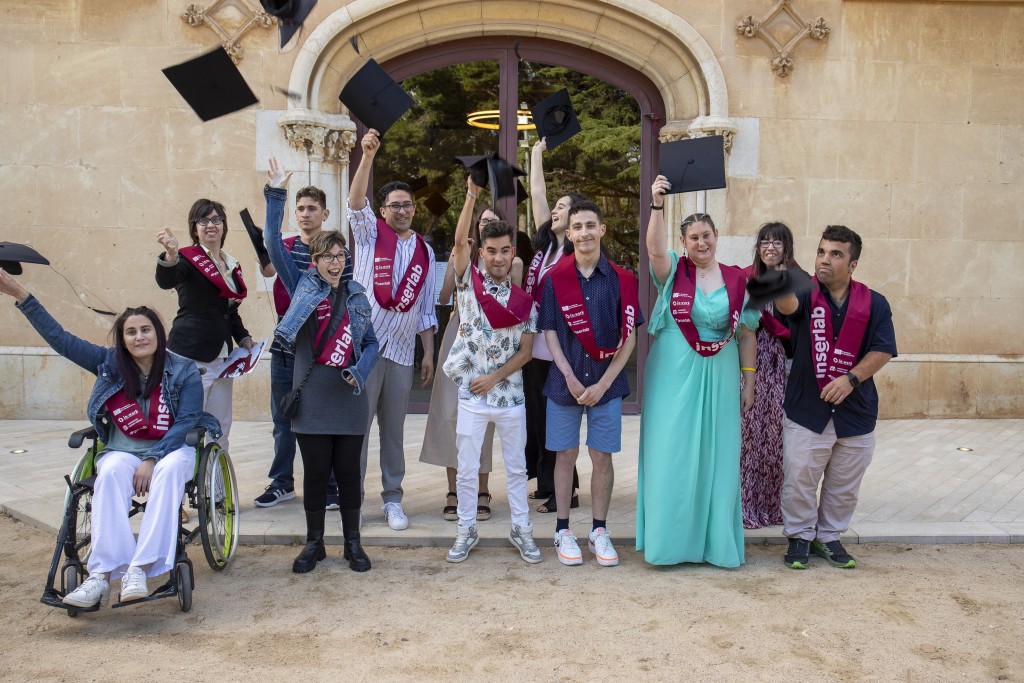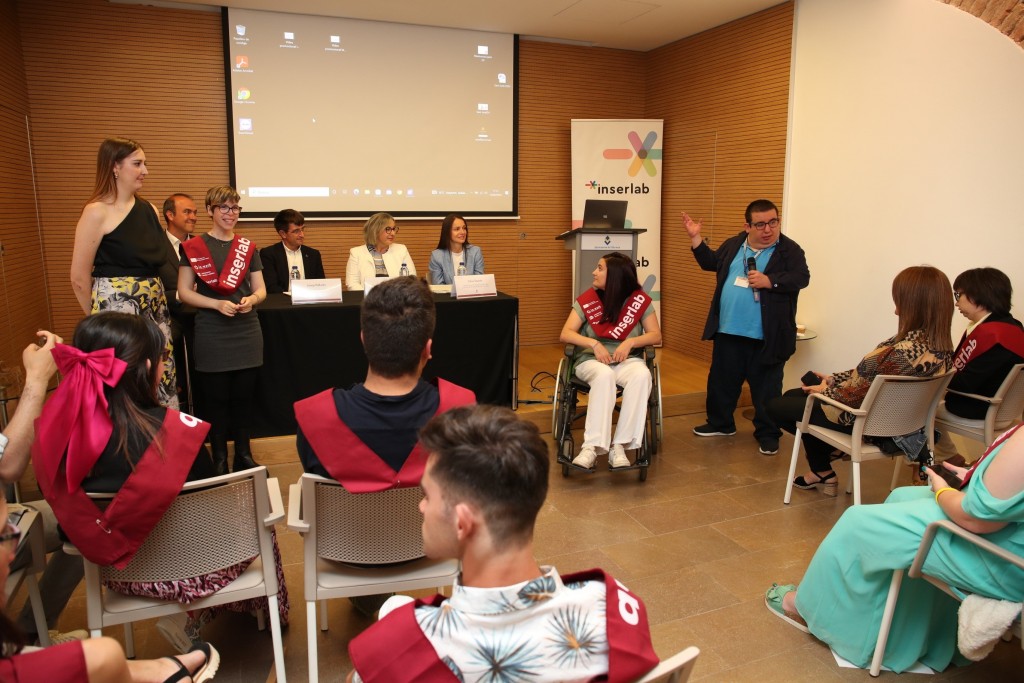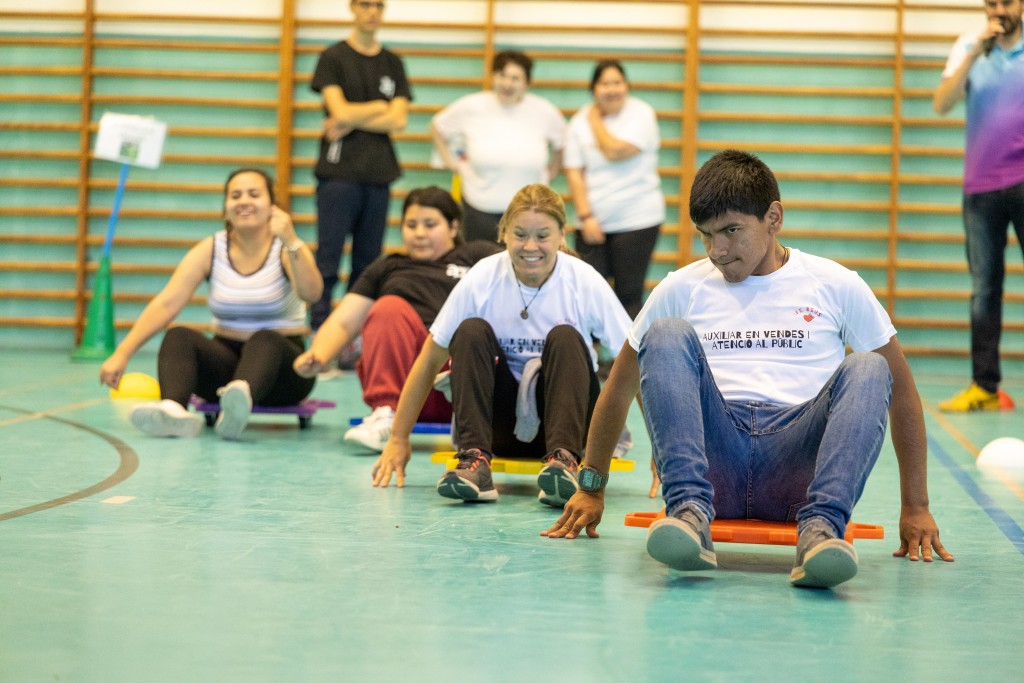Press notes 13/06/2024
The URV’s employment programme Inwork has shown the need for practical experience
The programme is designed for people with intellectual disabilities and has put them in touch with the world of employment through real entrepreneurship projects

The programme is designed for people with intellectual disabilities and has put them in touch with the world of employment through real entrepreneurship projects
The new URV employment programme for people with special needs, Inwork, has successfully completed the academic year. Conceived as a pilot test, this first edition has shown that the methodology used, which involves the participants having more practical experience and real contact with the world of work, empowers them and gives them a better preparation. The Inwork programme is part of the Inserlab project, which the URV first started five years ago to help young people with intellectual disabilities to find work. This year it has also included people with developmental disorders and autism spectrum disorders and it is innovative because it integrates learning into practical work experience.
“The combination of education with practical experience gives students the chance to apply theoretical knowledge in a professional environment and develop key skills for their future work”, says Teresa Torres-Coronas, the lecturer coordinating the project, who is positive about a “more active” methodology that has allowed students to interact with companies and other organisations, and check that they are able to do jobs that are useful for society. She also believes that this initiative helps to break stereotypes and to consolidate more inclusive cultures in companies.
After the success of the pilot year, the Inwork programme will continue next year (also from February to June) because ONCE will continue to provide funding and other companies and organisation, such as the Port Aventura Foundation, will also be taking part.

An example of the methodology used is the work the students submitted at the end of the course, the design of an entrepreneurship project: a company to provide care for the elderly. “It’s a very useful service for people who have relatives, for example, in a nursing home and need someone to visit them. They are ideally equipped to provide this support, to provide small care services,” explains Torres-Coronas, according to whom this sort of company shows that there is a place for them in the world of work.
On the other hand, in another practical experience during the course, the Human Tower Museum in Valls “hired” them to assess how the facilities had been adapted to visitors with different types of physical and intellectual disabilities, and they drew up a report with recommendations for improvement in aspects such as the cognitive accessibility of the information (that is, if it can be understood everyone), the readability of the texts, the signage of the spaces and access from the street.
Graduation ceremony
To bring the academic year to an end, the twelve boys and girls who had completed it were awarded their diplomas this Wednesday in an event held at Vila-seca Castle. They were all highly satisfied with the result of the programme. Judith Porras, for example, particularly appreciated the internships, which showed her how much she had improved and enabled her to envisage a working life, for which she has some projects and a great desire to try new things. She found the experience at the Museu Casteller de Valls particularly enriching, she says. Blanca Vílchez also pointed out that the internship showed her that she is “capable of anything”. And very soon she will be sitting the state examinations for a job in the administration.
During the ceremony, which was sponsored by Albert Canadell, director general of Promociones Blaumar, the rector of the URV, Josep Pallarès, made particular mention of the involvement of numerous agents who had made it possible “to turn the customary no into a yes.” Pallarès encouraged the new graduates to show willing, not to be afraid and to trust in their own abilities.

Inclusive Sports Day
At the same time, and as part of the same project, a group of students from the IFE (Specific Training Itineraries) of the Cal·lípolis Institute designed and organised the URV’s first Inclusive Sports Day. Held in April at the university’s sports hall, it had more than a hundred participants from the IFEs of the Domènech i Montaner Secondary School in Reus, the Andreu Nin Secondary School from El Vendrell and the occupational centre of the Onada Foundation. The student organizers of the day found that there was a great need for inclusion in sport. For Marc, the experience was enriching because he learned to “organise activities in terms of the specific needs of the participants, such as deciding what food to provide for a colleague with Prader-Willi syndrome”.
Jan, Xavier and Anna said that the day enabled them to “develop new skills and grow as people”, while Raba emphasized the importance of having helped to improve the facilities for the disabled, something he feels is “very rewarding”. For his part, Edgar highlighted the pioneering nature of the day and the need for it to be repeated by other universities. “The day is an excellent opportunity to show that everyone has the right to practise sport and enjoy what they love without limitations”, said Arnau. For this reason, inclusive sport must be given greater visibility.
